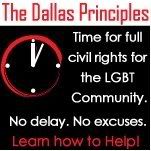
USA Today: Same-Sex Proposals Up in Less Religious New England States
Same-sex marriage proposals are sweeping into New England state legislatures this spring, particularly in places where organized religious opposition may be the weakest.
A USA TODAY analysis finds that states where the percentage of "nones" — people who say they have no religion — is at or above the national average of 15% are more likely to push expanding the scope of marriage, civil unions or same-sex partner rights.
Today in New Hampshire, where nones are 29% of the population, nearly matching Catholics (32%) and Protestants (30%), the House of Representatives is expected to vote to legalize same-sex marriage, and "it has a good chance of passing the Senate this week," says Marty Rouse of the Human Rights Campaign.
Friday in Vermont, a gay marriage bill that has passed the Senate goes to the House. Vermont has the highest rate of nones in the nation (34%), according to the newly released American Religious Identification Survey. Gov. Jim Douglas announced Wednesday that he intended to veto the bill if it passed.
Coming up: Legislatures in Rhode Island (nones 19%) and Maine (nones 25%) will hold hearings this spring on marriage "equality" bills. Nearby in New York (nones 14%), the Legislature could approve a bill "by the Fourth of July," Rouse says.
The religious identification survey's findings work in reverse, as well. The states with the highest rates of identification with conservative denominations — such as Catholic, Baptist, Pentecostal and Mormon — were more likely to be among the 30 states where voters have approved constitutional amendments banning gay marriage.
Barry Kosmin, Trinity College sociologist and co-director of the survey, says the correlation is no coincidence. "Given that 25% of GenX (those ages 29 to 42) and GenY (ages 18 to 28) are nones, this is where we are headed," he says. "It's a standoff between young people with a tremendous sympathy for civil rights and what appears to be biblical injunctions from religion."
The more secular countries and states are, the more they support LGBT rights. Clearly, the future of gay rights requires a more secular society and a strong separation of church and state.
See Also: 15% of U.S. Non-Religious (Up from 8%)
UPDATE: NH House Passes Gay Marriage Bill













1 comment:
Hmm indeed this is a good thing. It is mostly the Northeastern and coastal states that seem to to be the most secular and most progressive than the southern and middle states when it comes to gay rights.
Here in Maryland we have a weak form of domestic partnership. It is not much but it is something I suppose. They plan to revise the stature that our state has on marriage between man and woman so that way a person can marry who ever they want.
Post a Comment